We know eating real food is key for good health – but why? This post shares how the synergy of real food works nutrition magic.
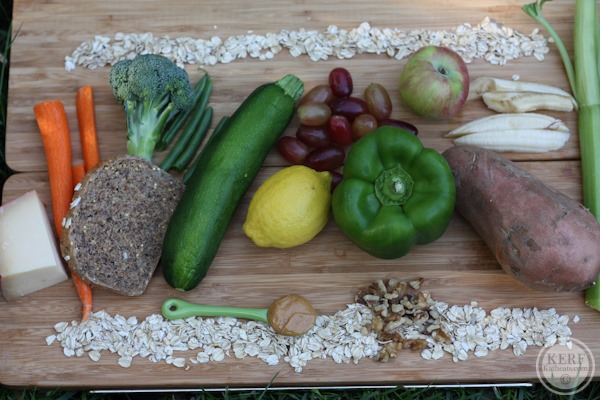
Research shows that eating real food reduces risk of chronic disease. Over the years scientists have tried isolating many of the known micronutrients in hopes of finding one that might lead to a medical breakthrough. However, when the individual components of food are isolated, the protective effect dissipates. Thus, there appears to be something synergistic about the natural blend of nutrients within whole foods.
Here are a few of the studies on whole foods I uncovered…
Eat Lots Of Fruits And Vegetables {Source}
In an epidemiologic review of 200 studies on cancer, researchers found that in 128 of 156 dietary studies (82%), the consumption of fruit and vegetables had a significant protective effect against cancer risk.
The risk of cancer with high fruit and vegetable intake = 1x
The risk of cancer with low fruit and vegetable intake = 2x
As you can see, fruits and vegetables don’t necessarily prevent cancer, but the research concluded that they decrease the risk of getting it. This study included cancers of lung, colon, breast, cervix, esophagus, oral cavity, stomach, bladder, pancreas, and ovary, so the span was broad.
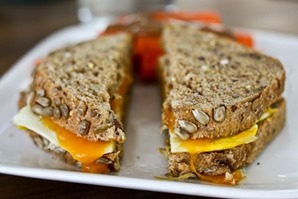
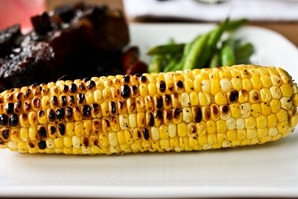
Eat A Diverse Diet {Source}
This is one of my favorite nutrition research figures:
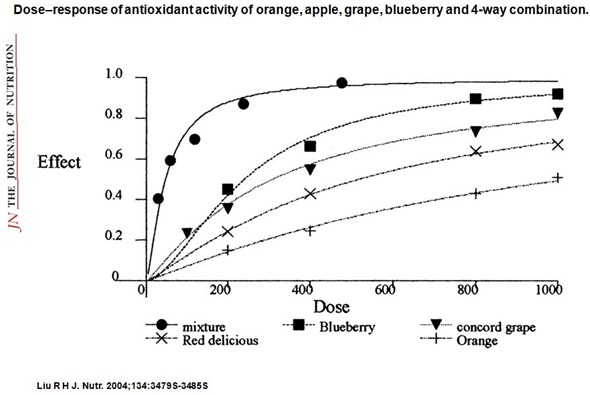
The graph speaks volumes to eating a diet as diverse as possible. Notice how the orange and apple alone had a lower antioxidant effect than all of the fruits consumed together? Mother Nature did not intend for us to subsist on oranges alone. My guess would be that the more diverse a meal is the higher the antioxidant activity, so eat your fruit salad with a sprinkling of mint and a slice of toast on the side. I wonder if there are foods or food-like additives that counter this effect?
Eat Your Whole Grains {Source}
This study examined the effect of whole grains versus refined grains on the risk of disease. Oats, for example, have been found to reduce serum cholesterol (particularly in those whose cholesterol was high). In a 12-week study, patients were given supplemental wheat bran that ended up having no effect on lipids, blood pressure, glucose tolerance or inflammatory factors. Thus, it appears that the whole is even greater than the sum of its parts. Eat your oatmeal people!
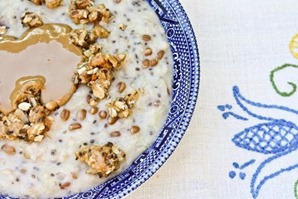
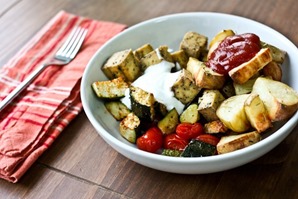
The Synergy In Real Food {Source}
The benefit of a diet rich in fruit and vegetables is attributed to the complex cocktail of phytochemicals, or micronutrients, found inside them. Researchers hypothesize that the phytochemicals have complementary and overlapping mechanisms of action, so they need to be in each other’s company to work properly.
These mechanisms of action include:
Regulation of detoxification enzymes
Stimulation of the immune system
Reduction of platelet aggregation
Modulation of cholesterol synthesis
Hormone metabolism
Reduction of blood pressure
Antioxidant, antibacterial, and antiviral effects
These overlapping mechanisms also explain why “too much of a good thing” can be harmful when nutrients are extracted and given in high doses in supplement form. If one nutrient is hogging all of the receptors, others might be excluded. This is the biggest reason why I am not a fan of weight loss pills and why I don’t recommend superfood supplements or concentrates. Eat real food and you can be assured that you’re getting doses that nature intended.
The Research On Supplements {Source}
When I was completing my dietetic internship, I put together a presentation on the the supplement industry verses whole foods. The supplement research is fairly conclusive – pills filled with isolated nutrients do not have the same health benefit that studies on whole foods have seen.
Most studies found that antioxidant supplements do not provide any disease prevention. These trials usually involved the administration of single antioxidants given at relatively high doses. Some trials actually found the doses to harm people (ex. high doses of Beta-carotene). As far as I know, there haven’t been any studies done on antioxidants at levels proportional to a real food diet, but these studies might shed new light on the topic. {But again, why would you want to just take a pill and not eat real food?}
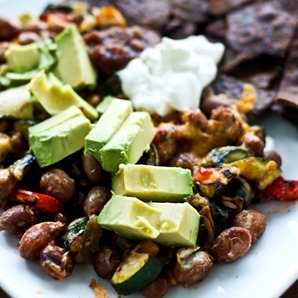
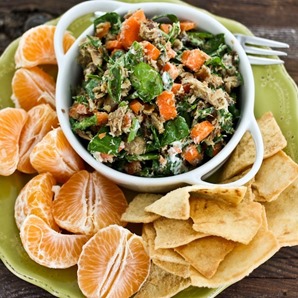
The Future Of Nutrition
Will nutrition science ever change the way we eat? I doubt it. Although nutrition science has grown by leaps and bounds to figure out the way food affects our bodies, this knowledge does not really change the fact that a diverse diet in real food has stood the test of time and has the epidemiological evidence to back it up. The more I personally learned about nutrition, the more I realized I didn’t even need to know what happened in my body on a molecular level to know what foods are best for me. I finished my program with a more relaxed view: that our bodies are miracles and that real food is best.

Tonya says
reading this while eating a salad of baby spinach, beets, broccoli, carrots, red onion, cranberry, sunflower seeds and hummus. I can feel the nutrients synergizing already! 😉
Emily @ Emily Rocks the Road says
Great conclusion – our bodies know what they’re doing if you fuel them right. Mother Nature knows what she’s doing. Vitamins and nutrients are in whole foods that way for a reason; when we strip down and isolate just one thing, like a particular vitamin, that’s not how it was supposed to be consumed for optimum usage. I know that since I started focusing on real foods and fresh plant-eating, I don’t even like the boxed stuff I grew up with anymore. Occasionally I’ll go to processed food for a quick meal when I’m beat, but it’s just not the same. Plus, I’m getting better at building a repitoire of quick and healthy meals.
Cynthia says
As a researcher, I have to disagree that nutrition science and research won’t have any impact on the way people eat. The whole reason we know all that you listed above is because of scientific research! Increasing knowledge gained by research in any field is a critical way our world grows and improves 🙂
KathEats says
I’m not at am saying it’s not valued, necessary or important! I’m just asking whether we’ll ever not be eating real natural food based on a scientific discovery
Ella P says
Though nutrition science and research provide broader deeper knowledge and insight, good food is a commodity not available to each and everyone. Even when available it may not necessarily be an option for some. Unfortunately.
Ali says
I very much agree with Cynthia. Just because you, personally, don’t “need” nutrition science to tell you what you should eat doesn’t mean others don’t. You often cite how much protein, carbs, etc. different real food has, but that’s all nutrition science. What if research indicated something CAUSES cancer and it’s a real food? Do you keep eating it because it makes you feel good long term when you eat it? Or do you take precautionary action? Research, whether information or formal, is how we learn and grow. Eating a certain way is technically research if you are evaluating how you feel afterwards or over time.
Also, just a weird side note, I am grateful you linked to sources, but as someone with publications under my belt that took many years of research, sweat and tears, I would rather see my actual name listed. I’m not sure why on blogs it’s okay to just say “source” with a link whereas in every other medium, a formal citation is required (along with a link if applicable and possible). Sorry, it’s a quirk of mine and I’ve been seeing it so much more on blogs lately.
Glad to see the encouragement of Real Food rather than junk, thank you!
Nicole says
Agreed. The only reason you know what macronutrients, micronutrients, phytochemicals, etc are, is because of scientific research focused on finding those specific chemical molecules. On top of that, it is because of science that we know why certain nutrients are important for us and how they biochemically react within our bodies. I am grateful that you like to focus on real food, but as you are an RD and based on your previous posts from when you were trying to lose weight, you obviously cared about the relationship between science and food at some point in time, and I think it is strange and sad that you have suddenly completely changed the way you speak of food and its irrelevance in science. As a biologist myself, this makes me extremely upset and sad.
KathEats says
I think you guys are missing my point. There are amazing things that have come from nutrition science (folic acid to reduce fetal birth defects being a huge one). I’m not at all saying it’s a waste of time or money. I’m just saying that when it comes to what I learned in organic chemistry, biochem, etc my food philosophy didn’t change. And despite everything science has discovered, a whole foods diet is still king. But like I have said, nutrition science is ever changing, so maybe they will discover that red foods lead to cancer in the years to come, and then I would certainly adapt my diet accordingly.
Holly @ EatGreatBEGreat says
This is a fantastic post! I truly believe that eating healthy will extend your life and keep you healthy. It’s really such an easy concept, but so many people don’t do it. I know that my husband and I have made a point to eat “real food” and I can say from experience that I feel a whole heck of a lot better.
mary @ minutes per mile says
what a great post. loved the graph about combining fruits/foods! amazing. thank you!
Megan King says
Kath, this is such a great post. It really highlights the truth behind eating real food for life. I am an RD as well and have to agree completely with all your points. It is simple and straightforward!
erin says
Thanks for this post!
As I make more real food, my husband is often asking me “what is good about this one?” or “what’s better about this than ____?” I can usually answer these questions, but also have to preface it with the fact that it’s not about the specific nutrient breakdown that makes something good. It’s about having a well balanced meal that allows all of these vitamins, minerals, etc to work together to fuel the body.
Getting our nutrients from real food is so much more complete than trying to isolate certain ones (plus it’s a lot easier to just eat grains, fruits, vegetables, etc than to try and pick and choose what supplements you need to take for whatever reason).
I will pass this along; very well written 🙂
Louise says
That dose response graph is important, however, I am having trouble finding any information about what data they used to produce that graph! I was interested in understanding how they prepared the fruits and assessed the antioxidant activity, however when you go to the article, which is a review, there is no explanation about the source of the data for that graph. I went back to their 2002 paper (Antioxidant and Antiproliferative Activities of Common Fruits) where they did extensive work characterising the antioxidant activity of fruits individually, but it doesn’t look like they assessed “synergy” in that paper. Am I missing something? Can anyone find a reference to what data was used in that graph in the paper/review, or find the graph in earlier papers from that group?
Kaila @healthyhelperblog! says
Love that first picture! Such a wide array of tastes, textures, and nutrients! As well as some of my favorite foods! 🙂
Anna @ Fitness à la Anna says
This is a great series you have put together, thanks so much for posting! Very informative and relevant 🙂
Ashley @ Hudson on the Potomac says
Read this while eating a mix of roasted zucchini, yellow squash, red pepper, green pepper, and red onion with black beans on the side!
I love eating my vitamins and I am loving your real food posts. I think educating people about nutrition is really a key to helping people lead a healthier lifestyle.
Suzanne @ hello, veggy! says
Loved this; thanks, Kath!
Michelle @ A Healthy Mrs says
Great info! A good reminder of how important real food is!
Have a great weekend!
Alex @ Kenzie Life says
I feel like I’ve learned so much about nutrition in the last few years and my diet is radically different now than it used to be. I rarely eat processed foods, but when I do, I make sure it’s in moderation and I try not to stress about it. I do find that I feel better mentally and physically when I make my own food or eat “real food”. I’ve also learned a lot about using foods to balance out my moods and mental health, and while I think there’s still a lot of research to be done to definitively prove some of these points (about the correlation between mental health and diet), eating certain foods has definitely made a difference for me!
Lindsey says
Nice post. What are the units on your plot? The engineer in me has to ask!
KathEats says
My guess is grams of fruit and a measure of antioxidants present. The graph came like this so whoever made it didn’t indicate.
Lea says
The paper refers to it as a median effective dose, so the units are presumably some combination used to indicate concentration.
Jeri says
I think posts like this need to be introduced more to families with small kids, especially those in low to mid income. Growing up we ate a lot of processed foods. When I had my own kids I did the same out of convenience being single and working. Now that they are older and I want and NEED to get healthy, I want to the same for them especially now that they are older. But I get met with resistance sometimes because my kids aren’t used to healthy eating. (think homemade hamburger helper as compared to the boxed version). I’m making small strides, but if I knew then what I know now……
S/N: why is it so expensive to eat healthy? LOL
Megan (The Lyons' Share) says
This is such a great post – thanks for sharing and including the studies! I really do believe that we overcomplicate things so much these days, and that eating a variety of real foods is all our body really needs!
Allison says
Thanks Kath! I find your blog so inspirational! I stumbled upon it a few months ago and am recommitting myself to clean eating and real food! The science behind it all should be enough to convince anyone but for those uninterested in the scientific evidence- I say try it and see how you feel! It’s amazing to see and feel the difference of what a clean diet can do for you 🙂
Thanks again!
Marissa@ohhhsolovely says
i’m really enjoying your posts like this. after all, you are so knowledgeable about these things!
Be ca says
Great post. Agree on the fact that real food is the best way to consume nutrients – but way are your thoughts in vitamins? Do you personally take any ? I never have but have thought about adding a calcium and iron vitamin daily but honesty eat healthy 80% of the time .
KathEats says
I do take a multi as a means of covering my bases, especially while pregnant and nursing. I’ve done diet studies before and despite a well balanced diet, I didn’t meet 100% of all of my vitamins and minerals. Maybe I did over an average within a week, but it’s hard to do. I wouldn’t take any super vitamins though – anything that’s 10x your RDA.
Kate says
I think real food is certainly preferable to supplements but in some cases (for instance for someone with dietary restrictions) supplements are necessary. Due to a chronic health condition, I must eliminate dairy and fruit from my diet so throughout my life a multivitamin and calcium supplements have been necessary to get the vitamins and minerals I need. I know for the vast majority of people, they can “eat” all their vitamins instead of taking supplements but I just thought I would point it out that some people need a little help. But I do eat lots of vegetables and whole grains so I do get to squeeze in lots of yummy whole foods as well. Thanks for the post!
Kori says
What multivitamin would you recommend, Kath? I haven’t taken one in a long time as I assumed I received enough nutrients from my diet, but I’m interested in adding a daily vitamin to make sure.
KathEats says
Really any of the certified ones are fine – look for the United States Pharmacopeia (USP) seal of approval. The supplement industry in general is very unregulated, but most multivitamins should have similar standard amounts that are recommended as a back up to food.
Nicole says
Bravo, Kath! I too was a dietetic grad and know how much research has to go into a post like this. It’s a great summary to why eating whole, real food is so important.
Andrea D says
Gosh Kath, as a dietetic student, I am in wonderland when I read these posts from you! I LOVE THEM SO MUCH. I love reading about the science of food and this has made my friday full of Organic Chem (ick) so much better now that I have read this. So, thanks fellow foodie. Oh and for emotional support and to keep some sanity I am reading back on your semester of Organic chem (2008) that you took in college to get tips on how to survive and it is helping me immensely. You were so busy with everything back then and you still did a great job! Thanks for being a good role model for me on my journey!
KathEats says
🙂 I was the Queen of flashcards!
Marie says
So could we just throw all the necessary fruit and vegetables into a juicer and get what we need that way?…say if we happen to be on the go. I found the vitamin pills to be more convenient, but now that you proved that inferior – I was wondering what would be the perfect combination of fruit and vegetable to be used in a juicer for the most benefit health-wise?
KathEats says
Well then you’d be missing out on all the fiber, plus other important nutrients like fat and protein. I would say a fruit and veggie smoothie would be a good addition to anyone’s day, but not in place of other whole foods like legumes, grains, dairy and other food groups you eat.
michelle says
Hi Kath,
I’ve always enjoyed the simplicity of your blog (I’m not an RD) but today’s post really left me confused. You reference a lot of, what seem to be, scientific terms and processes that some of us may not be familiar with. I usually look to you to unravel and decipher some of the current, on-trend nutritional happenings, but with this post, I’m just utterly confused (individual components of food, something synergistic about the natural blend of nutrients within whole foods, an epidemiologic review, protective effect, dose-response of antioxidant activity, antioxidants, serum cholesterol, lipids, inflammatory factors, phytochemicals, micronutrients, detoxification enzymes, platelet aggregation, cholesterol synthesis, hormone metabolism, antiviral effects, overlapping mechanisms, … ) sorry, there’s more confusion, but I just can’t muster up the energy to note it. In the future, it would be great if you could just present all this stuff in plain ol’ English for those of us not educated in your RD profession. Thanks!
lindsey says
This. Is. Brilliant. And the absolute truth! I highly reccomend everyone watch the documentary Forks Over Knives, it details this exact topic. It promotes the vegan (or plant based) lifestyle for health reasons, also touching on topics like cancer, diabetes and heart disease. As a nutritionist, I think you’d enjoy it! Great work as usual.
Heatherfeather says
Can you comment or write a post on your thoughts on dairy and gluten found in whole grain products? I am very active and try to eat clean, but I do not know the nutritional information vs. the current vegan/paleo movements. I think they have merit and have heard great reviews, but I do not understand the dietary benefits of cutting out low fat dairy and gluten if I’m not sensitive to it. Love your insight! 🙂
Trang says
Please keep doing these posts! I love the information as I try to fully incorporate a clean eating lifestyle.
Sarah says
I really like the informative posts like this, Kath…being an RD myself, I like the way you combine the sciencey stuff and the practical stuff all in one post. 😀
Alisha @ Gluten Free Perspective says
I just wanted to tell you how much I’m enjoying this series. I’ve been trying to 100% real food lately (it’s so hard!!!), but your blog has been really helpful. I’ve lurked in your archives and I’ve come up with some great meal planning ideas based on your past eats. Thanks! 🙂
Heather L. says
I love this series! I can’t wait to see what comes next.
Alison @ Daily Moves and Grooves says
Ahh yes! Real food is so satisfying, and now I know why! Thanks for the plethora of great info, Kath.
Kate says
I’m coming off the birth of my first child, and wanting to healthfully drop some baby lbs.- this post couldn’t have come at a better time! 🙂
Just out of curiosity, though: what, as a dietician, is your opinion of the Paleo diet/Whole30 challenge? I briefly considered one of these to guide my food choices, but feel it is so restrictive, I will almost certainly fail. And maybe it’s just the carb lover in me, but I find it difficult to accept whole grains, including legumes, as “bad” foods.
What are your thoughts? Is there any research out there that either supports or challenges the Paleo approach?
KathEats says
I feel they are too restrictive too. If you want to lose weight, eat less in general and more of the good stuff. Most people lose weight on Paleo because they’re eating less by restricting food groups and because they cut out things like cookies and white bread. I don’t think anyone gained weight eating beans..
Candice Dreyer says
I, too, am a registered dietitian, and have been fascinated with the paleo diet. I am really questioning the principles behind it vs what we were taught in school. The theory behind avoiding grains and legumes is that they supposedly contain “toxic and inflammatory proteins that weaken your digestive and immune system”. Kath, I’d love to hear what you think about that.
I personally have been doing Paleo for about a month and love it. I was already gluten and dairy free due to allergies, so it wasn’t a big switch. I was worried about lack of carbs, but so far, I have more energy, and WAY less digestive issues. I feel like it’s easier to eat more vegetables because half your plate should be composed of them.
I’d definitely been interested in hearing more on this topic 🙂
sara says
I have completed a whole 30 and have been eating paleo for about 6 months. After doing hours of research and truly understanding the reason behind paleo I don’t feel “restricted” at all.. Once I understand all the toxins and junk I was consuming it’s hard to go back to my old way of eating. The digestive distress I experience now if I choose to eat something I don’t usually eat is def not worth it. Just my two cents
Lily says
Hey Kath! Love the thought behind these posts… With respect to the antioxidant stuff, there’s a small body of research looking at dietary oxidative balance (i.e. pro-oxidant heme iron in meat versus antioxidant vitamins in veg) and it’s effect on cardiovascular risk, etc.. Others have looked at this with respect to early humans and noted that while we did used to eat more meat, we also ate way more plants, which balanced our oxidative status (and we used to be able to synthesize our own antioxidants – just a cool side note!)
Here are a couple pretty good reads (because I know you have infinite spare time… 😉
http://www.sciencedirect.com/science/article/pii/S1095643302003689
http://jn.nutrition.org/content/132/4/756.long
KathEats says
Thank you!
Amelia says
The article I told you about in Scientific American is along these lines. The research they present shows that eating foods raw/whole/in their natural form provides us with fewer calories than eating cooked/processed foods, since our bodies have to do the processing. They showed that a serving of raw almonds only yields 129 calories not 170 like it shows on the Nutrition Facts, but that wouldn’t be true for a processed almond product. So interesting!
Tiffany says
Kath, I loved this post! I really think a whole foods diet is best for optimal health and maintaining weight. I definitely think eating clean 80% of the time is important then having room for indulgences the other 20% of the time makes life much easier and sweeter! I love using whole grains, natural sweeteners and fruits to make delicious sweets!
As a side note, I remember you mentioned that you had Gina’s cookie dough cereal! I made some this morning because it was so hot here because hot oatmeal just didn’t sound good! It was so delicious! I used 1/3c of oats, heaping T of sunflower butter, cinnamon, salt, vanilla extract and cold almond milk! Thank you for inspiring me to try it! Have you tried her breakfast cookie before?
Simply Life says
I definitely appreciate and enjoy reading these posts- great new series!
Jay Scott says
Great article Kath. I totally agree with you and don’t think there can be any comparison to whole foods and supplements. Whole foods have so many more benefits than man made foods supplemental foods. That being said I do consume supplements for convenience sake.
I also agree with Tiffany above about the 80/20 rule. Leaving just a bit of space for indulgences is very important for full enjoyment of life!
Keep up the great writing, I’ll be back to check more out!
Jay Scott
Taylor says
really great post Kath! (I always enjoy your posts, but this one was really great!)
MelanieF says
Great read Kath! Thank you!
SheilaG says
What’s the difference between ‘real food’ and ‘whole food’? You seem to use the two terms interchangeably?
KathEats says
They are very similar in my opinion but whole food might be an apple and real food might be dried apples or applesauce. Minimally processed can still be real food IMO
Megan says
I found your blog after stumbling upon the post what is real food. You have such a simple straight forward approach which is so freeing to a person like me who got unhealthy obsessed with what’s “healthy” and what’s not. So I have a few questions. I hope you can answer. I know this is an older post.. first question is where can I buy bread without AL the added stuff? I don’t have access to great harvest. My next question is what kind of milk do you use? And finally, my family is lower income and I’m a stay at home mom.. what are some simple lunches and snacks that could be taken on the go? We usually eat leftovers or sandwiches but I know lunch meat isn’t exactly healthy. Thank you!
KathEats says
Hi Megan!
I’d look for any of the breads in your grocery store that are baked on site, if possible. I buy local grass-fed milk. Do you have access to a Costco? There are lots of healthy and organic products you can buy there – from big bags of pre-cut kale to pesto and feta for a yummy to-go massaged kale salad to organic milk and pre-packaged wild salmon filets. Buying in bulk might help keep the cost down a bit.
Megan says
Wow! Thank you so much for the speedy reply ? fresh bakery bread.. why didn’t I think of that?!? And yes I am a member of Costco! Great idea about buying more in bulk. Food is somewhere I am more than willing to splurge for our health especially now with an 18 month old son! I try not to be too restrictive and look for real food versions of my husband’s favorites (he wouldn’t be caught dead eating a salad). I currently bought grass fed milk that had not been homogenized .. didn’t go get well. He did not appreciate the “chunks”. He actually almost threw it out thinking it was bad LOL Love your blog! Thanks again
KathEats says
Haha!! Keep trying – you are doing great with the effort! And maybe he would like the pesto kale salad? It’s a bit heartier!